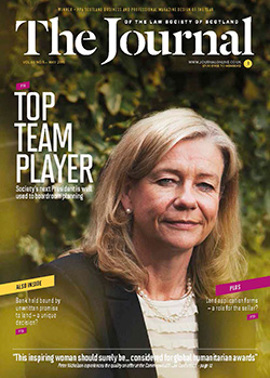President's column

As anticipated, serving as President of the Society for the past year has been a tremendous honour and a great privilege. Slightly more surprising – though enormously satisfying – is the depth of respect reserved for the Scottish solicitors’ profession in jurisdictions around the world. Needless to say, many other valuable insights and lessons have been learned in the course of fulfilling a packed presidential diary and meeting such a diversity of legal colleagues and others. Now, nearing the end of my term in office, I believe a fantastic opportunity awaits the Scottish solicitors’ profession.
Here at the Society, the first all-female presidential team will take office at the end of this month, a historic moment in our 66-year history. And just three weeks ago, our Council members approved a bold, aspirational strategy to update our previous Towards 2020 document. The five-year strategy, Tomorrow’s Law Society, aims to establish the Society as a world class professional body. A communications and engagement plan is being drawn up and the strategy, which is due to be published in the summer, will be used as a basis for the Society’s 2015-16 planning.
Time of opportunity
But developments at the Society are just part of the current process of change. The chief executives of the Scottish Legal Aid Board and Scottish Legal Complaints Commission, Lindsay Montgomery and Matthew Vickers respectively, both recently announced they were leaving their positions. In government, the Society is developing a positive and constructive relationship with the new Cabinet Secretary for Justice, Michael Matheson, and Minister for Community Safety & Legal Affairs, Paul Wheelhouse. The decision to remove the corroboration proposals from the Criminal Justice Bill was particularly welcome – and evidence of the important influencing role the Society can play in the decision-making process. The Society has paid tribute to all those leaving their posts for their contribution to a changing justice system, while also congratulating our own Neil Stevenson on his appointment as Matthew Vickers’ successor.
Further political change – to one degree or another – will follow this month’s General Election and the Scottish Parliament elections next year. Broader still, the economic outlook appears to be improving and many firms around the country are looking at options in adapting the way they work and serve their clients. No doubt others continue to experience difficulties, but the Society will do all it can to provide support and assistance to those determined to overcome the challenges they face.
Taken together, I suspect all these changes, and more, will present the Society and the solicitors’ profession with an opportunity to reassert our respected role in civic Scotland, taking pride in our privileged position as advocates for the public. Uncertainties remain, for instance over the strength of the economic recovery, and the constitutional role of Scotland in the UK and the UK in Europe, but I firmly believe that more opportunities than challenges exist in the months ahead.
Commonwealth spirit
Certainly, that mood of positivity was present at the Commonwealth Law Conference in Glasgow last month. All the many delegates I spoke to declared it a great success, due both to the technical content and the hospitality on offer from the host city and country. Personally, I found it fascinating – and, equally, humbling – to discuss issues around the rule of law and human rights with many at the very front line in defending and promoting those protections.
One of the highlights was the eloquent and knowledgeable closing speech by Michael Kirby, a former Justice of the High Court of Australia who was recently appointed by the UN Human Rights Council to lead an enquiry into human rights abuses in North Korea. His addresses on the issue of “homosexuality as a crime” provoked a heated response from a number of Nigerian delegates. Following a robust exchange of views, harmony was restored when Michael Kirby broke into an unexpected and emotional rendition of the Nigerian national anthem. Both the passionate nature of the discussion and the conciliatory resolution perfectly encapsulated the spirit of the event.
Finally, I would like to thank my family and the superb team at the Society for their support – it’s difficult to imagine how I would have fared during such a demanding but rewarding year without them. Christine McLintock has proved an excellent Vice President and I am sure Eilidh Wiseman will do likewise. I look forward to serving both next year as Past President.
In this issue
- Sham marriages v Sham interviews: which is the greater evil?
- A trusts law for the modern era?
- When cash just isn't good enough
- Un voyage en vaut la peine*: SYLA does France
- SYLA ends season on a high
- Appreciation: John Henderson
- Reading for pleasure
- Opinion: Mohammed Sabir
- Book reviews
- Profile
- President's column
- People on the move
- Application forms: should the seller adjust?
- When sharing matters
- After the launch
- Game of strategies
- Broken promises
- Charity legacies: the 10% conundrum
- Another "Whose money?" case
- Barrister barred
- Rearranging the family ties
- Belief in the system
- Living by the code
- The sky's the limit
- Unfinished business
- Law reform roundup
- Appreciation: Joseph Beltrami
- LBTT: what does it mean in practice?
- For those of a certain age
- Claims: trending?
- Ask Ash
- A man for all reasons
- The "TER approach"






